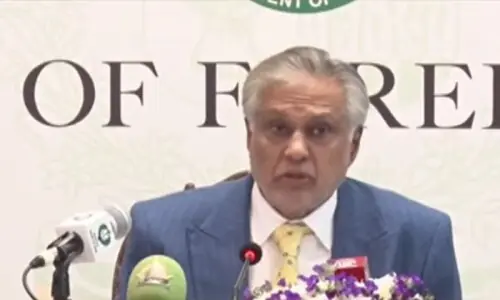LAHORE: An alliance of 28 civil society organisations (CSOs) has urged the World Bank (WB) and other stakeholders to go for a thorough analysis of climate change while preparing ‘Country Climate and Development Report (CCDR) for Pakistan’ so that such descriptions could prove to be effective as a diagnostic exercise and a framework for guiding future climate-responsible development.
In proposals to the bank and various other stakeholders, the Alliance for Climate Justice and Clean Energy (ACJCE) while commenting on the second phase of the World Bank’s Stakeholder Engagement with CSOs for the CCDR, said a thorough analysis should be made of the historical interplay between the bank’s development policy and finance operations, its advisory and technical assistance services, and its paradigms of development (and associated knowledge practices) and their connection to the present climate change crisis is a sine qua non.
The ACJCE suggests that any conversation on “integrating climate change and development considerations” must begin from a place of self-reflection and accountability so that history is not condemned to repeat itself. “From the perspective of ACJCE and other CSOs and activists engaged in climate action in Pakistan, this analysis is entirely missing in the present project design. In fact, from the identified themes in the Master Deck of slides shared by the bank, it is obvious that the bank has only focused on “what” the problems are — the more important question of “why” they exist is conspicuous in their absence,” reads the proposal.
Considering that the CCDR is a diagnostic report, the alliance said: “We are of the view that a detailed examination of the bank’s past practices is a prerequisite before setting the course for the future.” “It is imperative to identify responsible parties, generate appropriate actions for accountability, reform the process where needed, and create checks and balances to plug loopholes in the future.” It mentions that, according to the World Bank Group’s description of the project, the CCDR is being prepared as a “diagnostic report” to “integrate climate change and development considerations.” The alliance terms CCDR as an urgent and long-overdue exercise.
The exercise, according to the alliance, is not taking place in a vacuum. The need for such action arises from a global consensus that past patterns of consumption, production, development, and growth have been ruinous and destructive to mankind as a whole. “At this particular historical juncture, there is perhaps no better example of the extent and force of that destruction than the case of Pakistan itself—currently undergoing one of the worst floods in its history after months of record-high heat waves and unprecedented climate abnormalities,” it explains.The proposal claims that global financial flows have been the single biggest force carving the pathways to this destruction. The World Bank, it said, is fully implicated in the financing and support of a number of socially and environmentally destructive projects and irresponsible development policies in Pakistan — an ignominious history that is both well documented and well understood by Pakistani civil society.
The bank has been directly or indirectly involved in supporting costly and risky hydropower, irrigation, coal, and fossil fuel-based power projects, to name just a few. The alliance proposes that Pakistan’s CCDR should address some basic questions related to its own role before aiming to “inform governments, CSOs, the private sector and development partners’’ on “the development and climate agenda.”
The basic questions that must be considered and listed by the alliance while preparing the CCDR include the following:
The main methodological limitations in the bank’s research and analytic practices that have led it to support environmentally risky projects in the past, bank’s values, assumptions, and beliefs about economic development and market growth; the perpetual historic gap between the rhetoric of “protecting vulnerable” sections of the population and practices and outcomes on the ground, sources of knowledge and forms of data the WB typically relied on and what other sources and forms of data are necessary to incorporate in order to achieve the CCDR’s goal of “building on data and rigorous research to identify concrete, priority actions to support the low-carbon, resilient transitions” in an inclusive and meaningful way, limitations in the institutional framework of development policy finance, responsible climate finance; the damages incurred by Pakistani people due to the environmentally damaging projects and developmental paradigms supported by the bank; the forms of climate reparations; and a consultative process.
Published in Dawn, September 27th, 2022
































